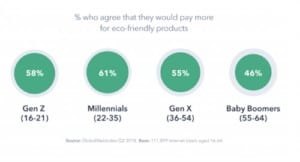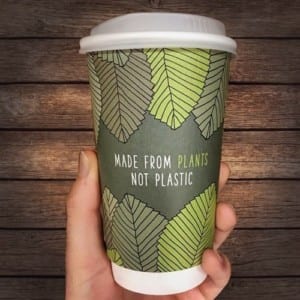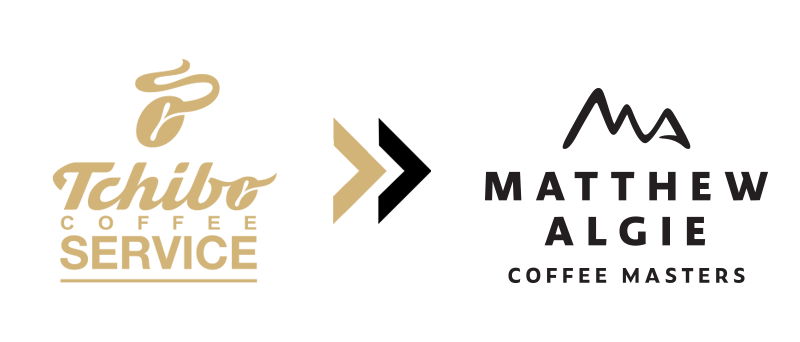Recycling coffee cups: What’s the solution?.
September 28th, 2018 | Business News
With a growing consumer awareness around the damaging effects of single-use plastics, it’s time for the coffee industry to adapt.
Addressing the problem.
Since the airing of Blue Planet II in 2017, UK consumers have shown increasing concern regarding the pollution of our world’s oceans and ecosystems – especially in relation to societies ‘throw away’ attitude towards single-use plastics.
When it comes to disposable coffee cups, it is estimated that 500 billion are discarded to landfill every year (source). The UK accounts for around 2.5 billion of these, of which less than 0.25% are said to be recycled (source).
Are coffee cups recyclable?
Most disposable coffee cups in the UK are made from paper which is tightly bonded to polyethylene plastic – ensuring the cup is strong & waterproof. This fusion of paper and plastic, as well as the fact the cups are considered ‘contaminated’ with drink, means that, in most cases, they are not biodegradable, compostable or recyclable at standard UK waste management facilities.
In fact, only a few specialist facilities in the UK are equipped to handle such waste (source). Unfortunately, this means a majority are sent instead to landfill where they can take up to 30 years to biodegrade (source).
Changing Attitudes.
Blue Planet II & the ongoing media coverage surrounding single-use plastics has proven to be a major catalyst for change in the UK. As public awareness on the issue continues to grow, an increasing number of consumers & businesses are beginning to reflect on their own habits and how they can help negate the damaging effect these items have on the environment.
Attitudes in the UK are shifting from a ‘throw-away’ society to one which is more mindful & sustainably focused, and an increasing number of consumers are now favouring more environmentally conscious brands.
Did you know over half of consumers surveyed said that they would pay more for eco-friendly products? (source)
Changing Business Practice.
The media continues to shed light on the misconceptions surrounding recycling, especially in relation to disposable coffee cups and other ‘throw-away’ plastic items like straws and cutlery.
A proposed UK ban on plastic straws, drink stirrers & many other single-use plastics (source), coupled with growing consumer pressure on businesses to conduct themselves more sustainably, has already prompted many businesses to introduce changes e.g. by removing plastic straws from their establishments entirely or switching to paper alternatives like those offered by Espresso Warehouse.
Many coffee businesses are now also offering discounted drinks for customers who bring their own reusable coffee cup – like Keep Cups – with them into stores. A move which not only helps reduce waste, but minimises the impact of a possible ‘latte levy” (source) on disposable coffee cups.
Taking Action.
Although a growing number of consumers are now switching to reusable coffee cups like KeepCup UK, most café businesses still rely on disposable cups as a means to fulfil a majority of demand.
With this in mind, many businesses are now seeking to introduce plastic-free alternatives such as fully compostable & biodegradable coffee cups. This allows them to maintain their usual takeaway beverage options whilst also improving upon their overall sustainability – an increasingly influential factor in the modern consumer’s purchasing decision.
One such product range helping coffee businesses go greener is Vegware.
Vegware: Made from plants, NOT plastic.
Vegware double wall coffee cups and lids are 100% biodegradable and compostable – made from plants, not plastic. Their outer wall is made from recycled board and inner wall from sustainable sources.
Did you know 61% of millennials are willing to pay more for eco-friendly products?

Vegware cups have an inner lining made from heat resistant PLA (polylactic acid) – a biodegradable alternative to plastic. This makes them commercially compostable where accepted and – depending on your waste collector – used cups and lids can be collected and processed along with any food waste.
Vegware disposable coffee cups and lids are independently certified to break down in under 12 weeks in commercial composting facilities and come in a variety of sizes.

There’s still work to be done.
Offering eco-friendlier disposable coffee cups is of course a step in the right direction in addressing societies ‘throw away’ attitude towards single use plastics. However, we must also recognise that certain regions within the UK still lack the waste management infrastructure which is required in which to optimise the breakdown of biodegradable & compostable products.
This is why Vegware is working actively to increase UK access to commercial composting via their ‘Close the Loop’ initiative (source).
While improvements in the waste management sector are ongoing, businesses can still have confidence that their biodegradable and compostable coffee cups will break down much quicker than regular plastic-lined cups – regardless of how they are handled.
Therefore, the implementation of fully biodegradable coffee cups like Vegware still proves to be an effective way of reducing the amount of plastic waste going to landfill.
Opportunities for Businesses.
Whilst changing attitudes, consumer habits and new laws and regulations present their challenges to coffee businesses, they can also offer opportunities for them to be innovative, differentiate themselves within a crowded market & even boost sales.
Did you know key findings of a WE communication survey found that UK consumers would pay on average 10% more for products if they believe that their purchase would benefit the environment or wider society? (source).
Find out more.
To find out more about our Vegware products, you can reach us via:
+ https://www.espressowarehouse.com/vegware/
+ Social Media: Instagram / Facebook / Twitter / LinkedIn
+ Email: webenquiries@matthewlaige.com
+ Customer Services:
0800 263 333 ( UK )
1 800 626 220 ( Ireland )
